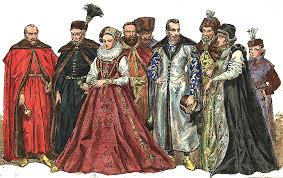记忆方法
记忆“nobility”可以通过创造一个与“noble”有联系的图像来帮助记忆。你可以想象一个“noble”(高尚)的人或者地方,例如一座“noble”的城堡或一个“noble”的领主,周围环绕着象征贵族身份的符号,如宝剑、桂冠或者高贵的纹章。这样,你就将“nobility”与贵族的高贵和尊贵联系起来,从而记住这个词。
以上内容由AI生成, 仅供参考和借鉴
中文词源
nobility 贵族
来自noble,高贵的。
英语词源
- nobility (n.)
- mid-14c., "quality of being excellent or rare," from Old French nobilite "high rank; dignity, grace; great deed" (12c., Modern French nobilité), and directly from Latin nobilitatem (nominative nobilitas) "celebrity, fame; high birth; excellence, superiority; the nobles," from nobilis "well-known, prominent" (see noble (adj.)). Meaning "quality of being of noble rank or birth" is attested from late 14c.; sense of "noble class collectively" is from 1520s.
权威例句
- 1. Despite its lack of formal power the nobility was not powerless.
- 尽管没有正式的权力,贵族阶层并非没有权势。
- 2. Most of them were the nobility and the landed gentry.
- 他们大多是贵族和地主乡绅。
- 3. In Norman England, the greyhound was a symbol of nobility.
- 灵犭是在诺曼时期的英格兰是高贵的象征。
- 4. She seemed to personify goodness and nobility.
- 她宛如善良和高贵的化身。
- 5. The new merchant class was anxious for acceptance by the old nobility.
- 新兴的商业阶层渴望得到旧贵族的接纳.

